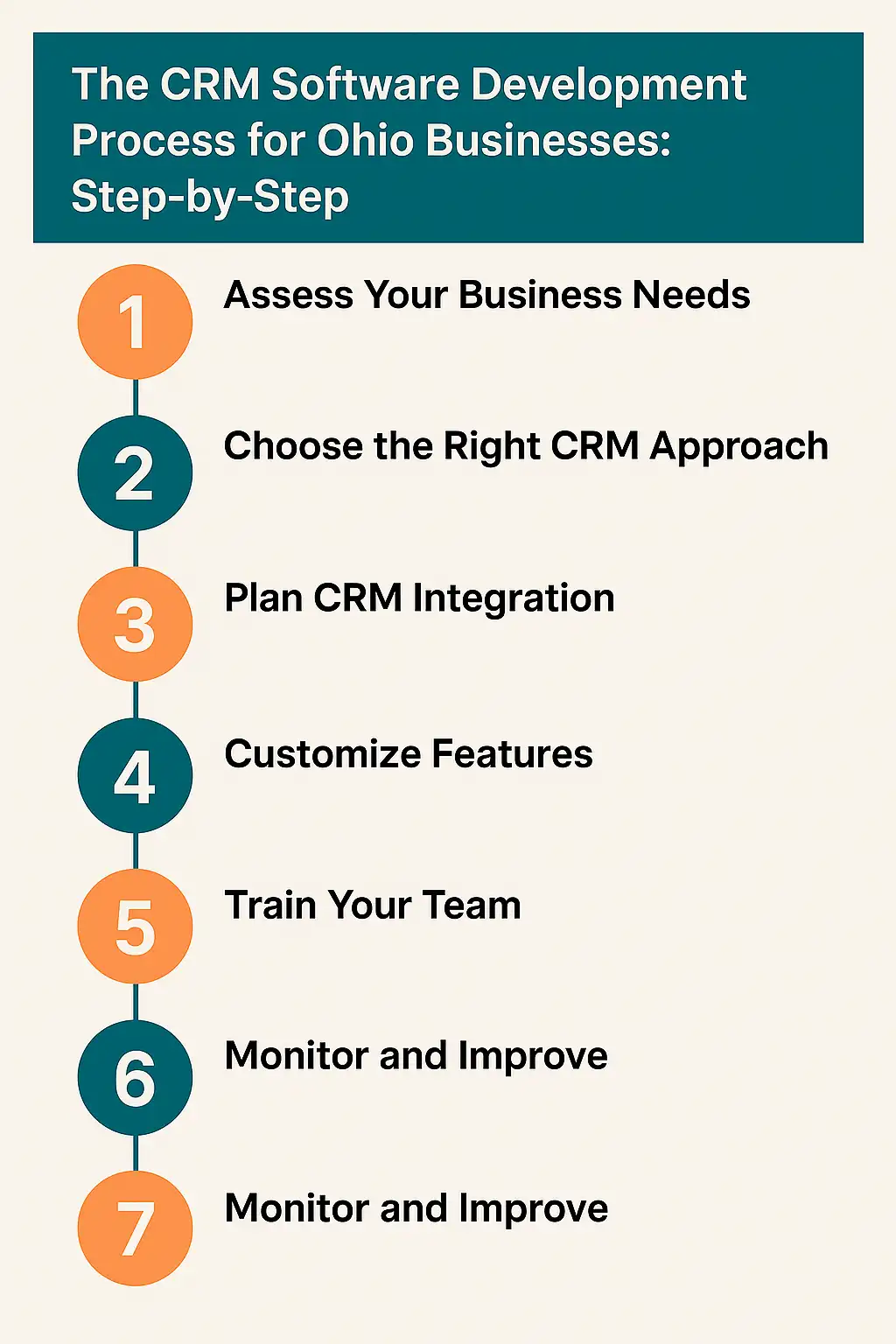Strong customer relationships drive growth for every Ohio business. Whether you run a small shop in Columbus, a growing startup in Cleveland, or a large enterprise in Cincinnati, managing customer data effectively makes a big difference. This is where CRM software development in Ohio helps businesses work smarter, not harder.
CRM, or Customer Relationship Management software, helps businesses organize contacts, track sales, and improve customer service. When companies invest in custom CRM solutions in Ohio, they create systems that fit their unique needs instead of forcing their teams to adapt to generic tools. This flexibility improves productivity, reduces errors, and strengthens customer loyalty.
Ohio businesses face competition across industries like manufacturing, healthcare, retail, and technology. To stay ahead, they need tools that do more than store information. They need a system that connects sales, marketing, and support teams in one place. With the right CRM implementation in Ohio, companies of all sizes can streamline workflows, automate daily tasks, and make better decisions based on real data.
This guide will walk through the complete process of CRM software development for Ohio businesses. It will explain the benefits, the steps to build or implement a system, and the common mistakes to avoid. Whether you manage a small business, lead an enterprise team, or advise Ohio companies on technology, this guide gives you a clear roadmap to make CRM work for you.
Why Ohio Businesses Need CRM Software Development
Ohio businesses face tough competition and fast-changing customer expectations. CRM software development helps them stay organized, build stronger relationships, and grow faster.
Here’s why CRM software development matters for Ohio businesses:
Stronger Customer Relationships
A CRM system stores every interaction in one place, from phone calls to emails. Ohio businesses use this to understand customer needs better, follow up at the right time, and provide a more personal experience.
Better Sales Management
Sales teams can track every lead, deal, and pipeline stage in real time. This helps Ohio businesses close deals faster, spot weak points in the sales process, and increase revenue without adding extra staff.
Custom Fit for Local Businesses
Off-the-shelf CRM tools don’t always work for Ohio’s diverse industries. Custom CRM software allows a healthcare provider to manage patient touchpoints, a manufacturer to track B2B contracts, or a real estate agent to manage listings and leads — all in one system.
Seamless Integrations
Ohio businesses often use multiple tools, from QuickBooks for accounting to email platforms like Outlook or Gmail. A well-developed CRM integrates with these systems, reducing manual entry and giving teams a single, connected view of operations.
Actionable Insights
With custom CRM software, Ohio managers can access dashboards and reports that highlight sales trends, customer behavior, and growth opportunities. These insights help decision-makers move quickly and stay competitive in local markets.
Scalability for Growth
As Ohio businesses grow from small teams into larger organizations, their CRM can scale with them. Companies start with simple contact management and later add advanced automation, analytics, or mobile features as their needs expand.
Read Also: Top 10 Mobile App Development Companies in Dallas TX
The CRM Software Development Process for Ohio Businesses: Step-by-Step

Developing CRM software for Ohio businesses does not have to feel overwhelming. When you break the process into clear steps, you can build or adopt a solution that truly fits your business. Here is a simple guide every Ohio business can follow:
Step 1: Assess Your Business Needs
Start by identifying what problems you want the CRM to solve. Do you need better sales tracking, smoother customer follow-ups, or easier marketing automation? Every Ohio business has unique challenges. Write down your goals so the CRM software development team can design the right solution.
Step 2: Choose the Right CRM Approach
Decide if your business needs a ready-made platform or a custom CRM solution. Small businesses in Ohio may benefit from simple, affordable CRMs that launch quickly. Larger enterprises often need custom CRM software development to match complex workflows. Choose the option that supports your growth plans.
Step 3: Plan CRM Integration
Plan how the CRM will connect with your existing tools. Most Ohio businesses use accounting software, email systems, or POS solutions. A good CRM integrates smoothly with these systems, so your team can save time and avoid switching between multiple platforms.
Step 4: Migrate Customer Data
Move your existing customer data into the new CRM. Keep the process clean by removing duplicate or outdated information. Data migration is a key step in CRM implementation in Ohio, and it ensures your team starts with accurate records.
Step 5: Customize Features
Adjust the CRM to match your business needs. Add fields for local customer details, build dashboards for sales teams, or create workflows for client support. Custom CRM solutions in Ohio give you flexibility and keep the system aligned with your operations.
Step 6: Train Your Team
Introduce the CRM to your staff with clear training sessions. When your sales, marketing, and support teams know how to use the system, adoption rates increase. A CRM is only effective when your team feels confident using it daily.
Step 7: Monitor and Improve
After launch, track how the CRM performs. Monitor customer interactions, sales growth, and workflow improvements. If something does not work as expected, adjust it quickly. The best CRM software development process in Ohio includes regular updates to keep the system effective.
Read Also: App Development Cost in Ohio: A Complete Pricing Guide
Custom vs. Ready-Made CRM for Ohio Businesses
Ohio businesses face an important decision when they choose CRM software: go with a ready-made solution or invest in custom CRM development. Both options have strengths, and the right choice depends on business size, goals, and budget.
Ready-Made CRM Software
Ready-made CRM solutions give Ohio businesses quick access to essential tools. Small businesses often choose these platforms because they cost less upfront and come with built-in features like contact management, sales tracking, and email integration. Companies can set them up fast and start using them without heavy technical work. However, ready-made systems may limit customization. Businesses that grow quickly or need industry-specific features often find these systems too rigid.
Custom CRM Solutions
Custom CRM software development offers Ohio companies the freedom to design a system around their exact needs. Enterprise teams benefit from a solution that fits complex sales processes, integrates smoothly with existing systems, and scales as the company grows. Custom CRMs take longer to build and require more investment, but they give businesses full control over workflows, data management, and reporting.
Which Option Works Best?
Small and mid-sized businesses in Ohio may start with ready-made CRM platforms for speed and cost efficiency. As the business grows, custom CRM development becomes a smart move to support advanced features, local compliance, and unique workflows. Tech managers and consultants should evaluate current needs, growth plans, and industry requirements before recommending a path.
Read Also: Top 10 Mobile App Development Companies in Columbus
CRM USE Case for Ohio: Local Use Cases
CRM software development gives Ohio businesses real results. Local companies in different industries already use CRM systems to grow faster and serve customers better.
1. Retail Businesses in Columbus
Small retailers in Columbus use CRM software to track customer purchases and loyalty programs. Store owners send personalized offers based on shopping history. These features improve sales and keep customers coming back.
2. Manufacturing Firms in Toledo
Manufacturers in Toledo rely on custom CRM solutions to manage B2B sales pipelines. Sales teams track leads, schedule follow-ups, and forecast demand with better accuracy. The CRM system also integrates with inventory tools, so managers see a complete view of operations.
3. Healthcare Providers in Cleveland
Healthcare providers in Cleveland use CRM software to improve patient engagement. Doctors and staff track appointments, send reminders, and follow up with patients more effectively. These CRM features help reduce missed visits and improve overall care.
4. Financial Services in Cincinnati
Banks and financial advisors in Cincinnati use CRM systems to manage client relationships. Teams record client interactions, track financial goals, and deliver personalized services. This approach builds trust and improves customer retention.
5. Small Businesses Across Ohio
From family-owned shops to startups, small businesses across Ohio use CRM development to compete with larger players. Owners gain insights into customer behavior, manage marketing campaigns, and build long-term loyalty.
Conclusion
CRM software development gives Ohio businesses the tools to grow faster and build stronger customer relationships. Small and mid-sized businesses use CRM to simplify sales and service. Enterprise teams in Ohio rely on custom CRM solutions to manage complex operations. Tech and IT managers benefit from easier integrations and secure data handling. Consultants and advisors recommend CRM because it delivers measurable value.
The right CRM system helps you track customers, close more deals, and keep your team organized. A tailored solution also ensures your CRM grows with your business instead of holding you back. Partnering with a custom software development company in Ohio ensures your CRM is designed around your unique needs, while also giving you access to software product development services in Ohio that support long-term growth.
